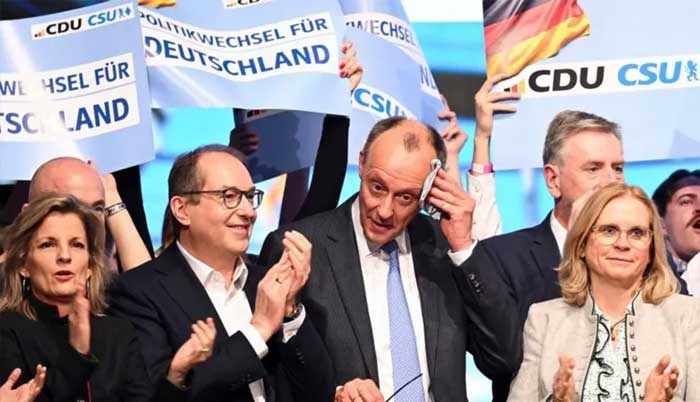
BERLIN, Feb 24 (NNN-AGENCIES) — Germany’s center-right Christian Democratic Union (CDU) is set to return to power with the far-right Alternative for Germany as second-largest party, exit polls show, after snap elections dominated by concerns over immigration, the economy and the return of Donald Trump.
The CDU’s party headquarters were filled with cheers and applause on Sunday evening as the exit polls were revealed and it became clear that the opposition party was set to become the largest group after Sunday’s election. Outside the building, a small group of protesters had gathered to demonstrate against what they perceive as party leader Friedrich Merz’s hard line on immigration.
Merz declared victory at the event in central Berlin, as he told supporters “Let’s get the party started,” an apparent nod to wanting to get coalition negotiations underway quickly.
If the exit poll stands, the CDU will claim 28.8% of the vote in Sunday’s election, meaning Merz – an old-school conservative who has never held a government role previously – will become the new chancellor of Germany, Europe’s biggest economy and most populous state.
The far-right Alternative for Germany (AfD) came in second, according to the exit poll, with an unprecedented 20.2%, meaning the party – once on the fringes as officially suspected of extremism now a major political force. However it faces exclusion from government by other parties, due to what is known as a “firewall” arrangement.
The mood at the AfD election party was ecstatic as it emerged that the party had almost doubled its support, with people cheering and waving Germany flags. Party co-leader Alice Weidel took to the stage to tell cheering crowds that the AfD had “never been stronger.”
Chancellor Olaf Scholz’s center-left Social Democratic Party (SPD) looked set to come in third with 16.2% – signaling a dramatic turnaround in the party’s fortunes since the 2021 election, when it took 25.7% of the vote.
Also notable in the exit polls was a successful outcome for the socialist Die Linke party, which won 8.5% – comfortably pushing it over the 5% threshold needed to enter parliament.
The “traffic light” coalition, led by Scholz, brought together an uneasy alliance of three ideologically different parties and its collapse triggered Sunday’s snap vote, a relative rarity in a country which has long had one of the most stable political systems in Europe.
Nearly 60 million Germans were eligible to vote on Sunday, according to data from the country’s Federal Statistics Office.
Sunday evening’s preliminary results cap off an eventful election period that drew extraordinary involvement from White House officials and has once again seen debate rage around Germany’s immigration policies.
Trump sent shockwaves across Europe after he pushed ahead with peace talks on Ukraine with Russia, excluding both Kyiv and European leaders. — NNN-AGENCIES




